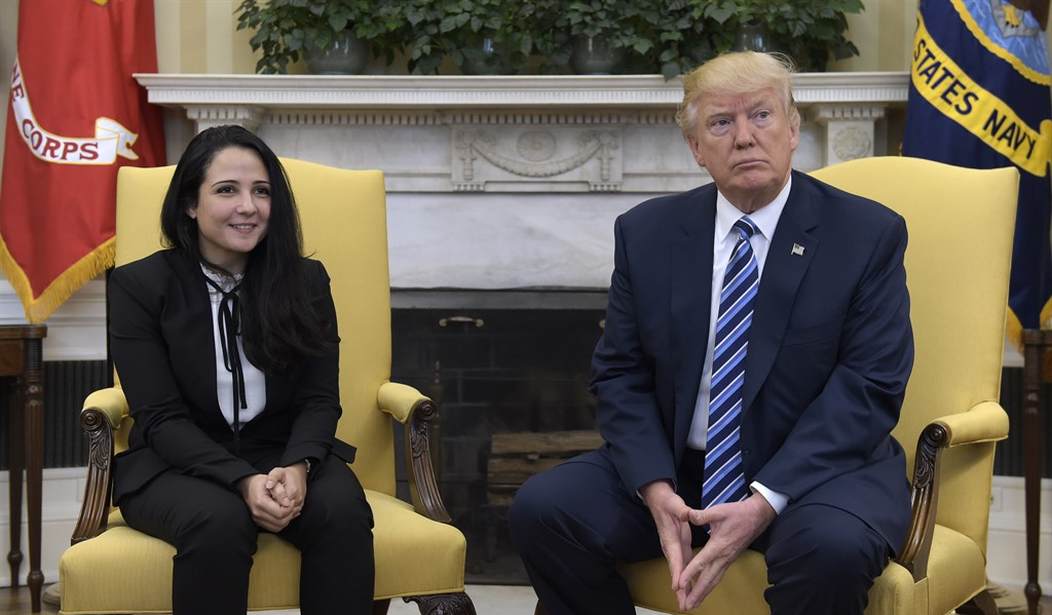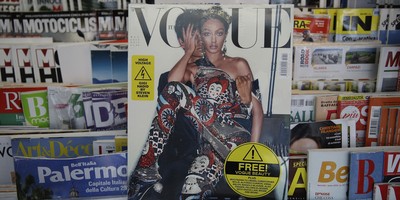Of all the Twitter attacks on President Trump -- and there are thousands every day -- one stood out on election eve. It was a photo of a woman sitting with the president in the Oval Office. It read: "Trump leaned in and said, 'You know it's I who released you, don't you? I succeeded and Obama failed.' In the most vulnerable moment of my life, 48 hours after releasing me from prison. It was never about me like it was never about us. It's about his ego. We deserve better. #VoteBiden."
The tweet was sent by a woman named Aya Hijazi. Here is her story, and the story of the tweet:
Hijazi is an Egyptian-American activist who grew up in Falls Church, Virginia, in the suburbs of Washington, D.C. She went to college at George Mason University. In 2011, after graduation, she moved to Egypt and founded the Belady Foundation, "an organization that aims to shelter and rehabilitate marginalized street children," according to a Washington Post profile.
In 2014, Egyptian police raided the office of the Belady Foundation and arrested Hijazi. She was held without charge and eventually accused of "operating an unlicensed organization, inciting street children to join pro-Muslim Brotherhood protests and sexually assaulting minors," according to the Post. The charges were baseless. But Hijazi was stuck in an Egyptian prison -- definitely not a good place to be.
Here was the really bad news: The United States government showed no interest in helping her. President Barack Obama and Vice President Joe Biden stayed out of the case of an American citizen unjustly imprisoned abroad. "Inside prison, her captors were puzzled," wrote the Post's Jackson Diehl in 2017. "Why, they asked, did the U.S. government do nothing to help her? For more than two years, the State Department offered no public protest or even expression of concern about her case." In an interview with Diehl, Hijazi said, "I felt abandoned. It was so sad to be forgotten and not cared about when America can do so much."
Recommended
Three years passed. Hijazi remained behind bars. Then Donald Trump was elected president. Unlike Obama and Biden, Trump was not afraid to put pressure on Egyptian President Abdel Fatah al-Sissi. Trump personally brought up Hijazi's case when al-Sissi visited the White House in April 2017. The meeting itself was "a reversal of U.S. policy after President Barack Obama refused to invite him, because of concerns about human rights violations," according to the Post.
But Trump talked to the Egyptian strongman, and things got done. Somehow, an Egyptian court almost instantly acquitted Hijazi. The prison door opened. "Within days of Trump's intervention on her behalf ... Hijazi was flown out of Egypt on a U.S. plane," Diehl wrote. Not long after, she met with Trump in the Oval Office. "He was very hospitable," Hijazi told PBS of the meeting with the president. "He made us feel very welcome, and he admired our strength and our work for the children. So I was glad."
That was then. Now, there's an election going on. And Hijazi is telling a different story. Trump never cared about her, she tweeted. It was all about his ego. And by the way, vote for Joe Biden.
But first, remember that if Trump said what Hijazi alleged, it was true. Obama did nothing for Hijazi, and Trump did. She was trapped in prison in a country with a terrible human rights record, and when Trump, unlike his predecessor, took up her cause, within hours she was on a plane to the United States.
And assume for a moment that Hijazi's description of the White House meeting is entirely accurate, and freeing her was, in fact, a big ego trip for Trump. So what? Did she prefer to be in an Egyptian prison under President Obama to being free under President Trump? Really?
In another tweet, Hijazi wrote, "I felt torn after the meeting, worried about not being a loyal person, as Trump demands loyalty as a means of maintaining control. But the government should not help citizens to make them loyal; it should do help because it is the right thing to do. #VoteBidenHarrisToSaveAmerica."
Did Trump really demand Hijazi's loyalty? Did he demand that she vote for him? That she provide an affidavit declaring that loyalty? Or did he want something much simpler -- gratitude? On Twitter, many people read Hijazi's words and asked why she didn't appreciate what President Trump had done. Put aside all the other noise around her case. She was in prison. One president ignored her. Another president freed her. Who wouldn't be deeply grateful for that? Instead, Hijazi questioned Trump's motives. He should have done it because it was "the right thing to do," as she defined it.
None of that means Hijazi can't support Joe Biden. Of course she can. But why take a public shot at the man who freed her?
The Hijazi case echoes much of the continuing controversy around Trump. There are people who appreciate what he has done -- who appreciate the economic prosperity they experienced under his presidency, who appreciate the conservative judges he has appointed to the Supreme Court and other top courts, who appreciate the way he has freed the economy from burdensome regulations, who appreciate the way he destroyed ISIS and more. But much of the popular culture demands that they express their disapproval of the president. He does things for the wrong reasons! It's all about him! And the tweets! Hijazi's case is an extreme one -- she owes her very freedom to Trump -- but it is not at all unusual.
Byron York is chief political correspondent for The Washington Examiner

























Join the conversation as a VIP Member